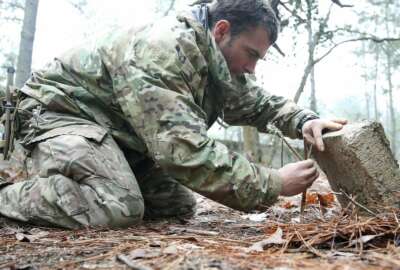The Army is starting its new process for evaluating soldiers to command battalions based on a multitude of factors including physical fitness, subordinate surveys and panel screenings.
Named the Battalion Command Assessment Program (BCAP), the Army hopes to put better leaders in command positions based on more factors than just ratings from superiors.
“It’s about transformational change,” Army Chief of Staff Gen. James McConville told reporters in the Pentagon via video link from Ft. Knox, Kentucky on Thursday. “Battalion commanders are the most consequential leaders in the Army because they train and develop our young soldiers — NCOs and officers — they have more impact on their decisions to continue serving than any other leader.”
McConville said the Army was spending more time assessing privates going into Ranger school than commanders who would lead soldiers.
The process, taking place at Ft. Knox, will select battalion commanders for 450 commands. The assessment started Jan. 15 and will end Feb. 9 after evaluating more than 800 soldiers.
The five-day event tests majors and lieutenant colonels on cognitive, non-cognitive, verbal and written skills. It assesses their mental and physical state, the Army conducts a panel screening of candidates and surveys subordinates about the officers.
McConville likened the process to an NFL combine where the Army sees the potential commanders’ skills on display. The Army will whittle down the approximately 800 soldiers into three groups. The top ranking officers will take command of battalions. The middle tier will go on an alternate list and be called up to take command if a top-tier commander is injured or does not want the command. The lower tier will be told to try again next year. Officers can go through the BCAP process three times. Officers end up in the lower echelon if they do not meet height or weight standards, do not pass the physical fitness test or the test determines they need more development to be commanders.
“We are going to be in a much better position to take a look at where certain officers have holes in their swings and we can go back and start developing that,” McConville said. “If we have someone who has sharper elbows or could work better with their peers or subordinates, we can catch that early on.”
BCAP is part of the Army’s People Strategy, which came out in October.
The Army wants to find and capitalize on soldiers’ skills that aren’t reflected in the current, two-dimensional system that looks almost exclusively at a person’s rank and career field. Instead, the service is adopting a more modern talent management system that manages people on the basis of 25 separate variables.
BCAP is based off of ways U.S. Special Operations Command evaluates its people. The Army used 35 operational psychologists to help develop the test.
It also conducted a pilot BCAP last summer in Ft. Benning, Georgia.
“What we found is through BCAP we came up with very different decisions about who we would have put in command compared to the traditional selection system,” Army Talent Management Task Force Director Maj. Gen. J. P. McGee said. “What we are saying with BCAP is we need to take in other relevant information about candidates for battalion command to make the best informed decision as an Army about who to put in those positions.”
McGee said relying on what a supervisor sees is not providing a good picture. In fact, during the first BCAP process, the Army had a more than 70% response rate from subordinates commenting on candidates.
The Army says it may expand the process to other leadership positions.
Copyright
© 2024 Federal News Network. All rights reserved. This website is not intended for users located within the European Economic Area.
